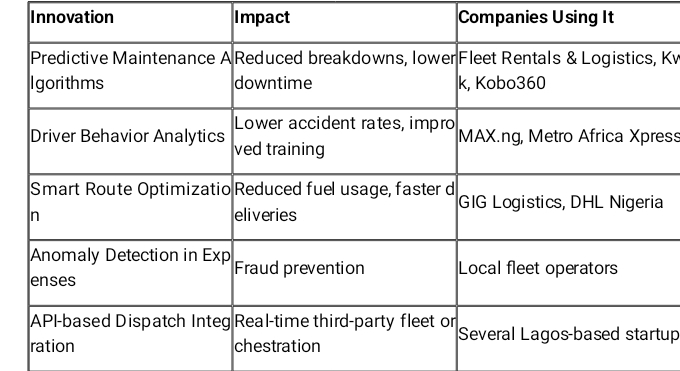As Nigeria’s transport and logistics sectors recover from pandemic-era disruptions, a quiet but powerful revolution is taking place behind the scenes—driven not by trucks or trains, but by algorithms.
From Lagos to Kano, artificial intelligence (AI) and predictive analytics are being deployed to optimize routes, reduce risk, and bring new levels of efficiency to one of Africa’s most complex logistical environments.
While global headlines often focus on fintech or digital banking, experts say that AI’s biggest short-term impact in Nigeria may come from logistics and fleet intelligence—and it’s local talent powering this shift.
“We’re no longer guessing. We’re forecasting,” says Foluke Ekundayo, a Lagos-based enterprise technology specialist who led major AI integration efforts at one of Nigeria’s largest logistics firms.
“Data is now driving delivery models, fraud detection, and even vehicle safety scoring. It’s the new operational advantage.”
A Sector Ready for Disruption
Nigeria’s logistics and transport industry is massive, but it’s also fragmented. With over 90% of freight and inter-city movement happening via road, and urban congestion increasing annually, the need for optimization is critical.
According to the Nigerian Bureau of Statistics (NBS), delays, fuel inefficiencies, and vehicle breakdowns account for over ₦600 billion in annual losses.
These challenges have pushed logistics companies to look beyond traditional tracking systems—and into predictive intelligence platforms.
Enter AI
In the past five years, Lagos has seen a 35% increase in the number of logistics firms adopting telematics and AI-based route planning.
Much of this innovation has been driven by local engineers and IT leaders who combine African market familiarity with technical rigor.
Case Study: Building Intelligence into Fleet Systems
Among the standout examples is the transformation undertaken by Fleet Rentals & Logistics Ltd, a regional logistics company that services supply chains for retail, FMCG, and manufacturing clients across West Africa.
Between 2014 and 2022, the firm initiated a sweeping overhaul of its technology stack—shifting from static scheduling to dynamic, AI-powered vehicle management.
The architect behind that shift? Foluke Ekundayo, who at the time served as the company’s Regional IS/IT Manager.
Armed with a background in Computer Science and Management from the University of Ghana, Ekundayo implemented machine learning models that predicted vehicle failure, flagged potential fraud, and monitored driver behavior in real-time.
“When we deployed AI into our fleet operations, we didn’t just want dashboards,” Ekundayo recalls. “We wanted systems that could learn from past deliveries, optimize the next one, and prevent losses before they happened.”
Her team introduced anomaly detection systems to curb fuel card misuse, telematics alerts to reduce speeding, and automated route allocation tools that cut delivery delays by over 20%.
These innovations contributed to a 25% reduction in fraud-related losses and a marked improvement in safety compliance across the board.
A Growing Ecosystem of Female Tech Leaders
The logistics AI boom isn’t just a tech story—it’s also a gender story. Women like Ekundayo are increasingly emerging as thought leaders in the application of emerging technologies within traditional sectors.
As the male-dominated logistics industry slowly diversifies, female tech professionals are carving out roles in analytics, automation, and strategic systems design.
“I think there’s a misconception that logistics is purely a boots-on-ground field,” Ekundayo notes. “But what’s happening now is more intelligence-driven than ever. It’s about data fluency, strategic modeling, and responsive design—all areas where women in tech are making their mark.”
Her perspective aligns with data from Nigeria’s National Information Technology Development Agency (NITDA), which reported a 17% increase in female-led tech transformation initiatives across transport and logistics between 2020 and 2022.
AI in Logistics: More Than a Trend
According to analysts, the adoption of AI in Nigerian logistics isn’t merely following a global trend—it’s local necessity meets local ingenuity.
Dr. Haruna Kure, a transport economist at the University of Ilorin, explains: “Africa’s logistics challenges are unique. What works in Berlin doesn’t always apply in Benin. That’s why indigenous innovations—like predictive delivery windows based on traffic data or machine-learned maintenance cycles—are not just innovative, they’re essential.”
Across the continent, similar models are gaining traction. In Kenya, AI-based cold chain tracking is improving vaccine storage. In Ghana, drone delivery analytics are reducing overhead.
Nigeria’s own use case, especially in the fast-moving consumer goods sector—has shown measurable returns.
“One of our models started picking up risk flags 48 hours before a vehicle would break down,” says Ekundayo. “That’s not just machine learning. That’s margin protection.”
Challenges to Scale
Despite the success stories, the road ahead is not without bumps. Industry experts point to several barriers to widespread AI adoption in Nigerian logistics – Data silos: Many operators still don’t collect structured fleet data.
Skill gaps: There’s a shortage of trained AI engineers familiar with transport-specific datasets.
Infrastructure bottlenecks: Frequent power outages and poor internet access in some regions limit real-time analytics.
“AI isn’t plug-and-play,” Ekundayo cautions. “It requires investment in clean data, user retraining, and long-term thinking. It’s not a dashboard—it’s a discipline.”
Nevertheless, these challenges have sparked new collaborations. NITDA and the Nigerian Association of Road Transport Owners (NARTO) are working on standardized frameworks for fleet data collection and AI model validation.
Meanwhile, local universities are launching certificate programs focused on transport informatics and machine learning operations (MLOps).
Looking Ahead: Regulation, Ethics, and Scale
As Nigeria builds toward a smart economy, regulation and ethical AI deployment will also come under scrutiny. Ekundayo highlights the importance of privacy protocols, especially as telematics and driver behavior data become central to logistics decisions.
“We need frameworks that protect people while enabling intelligent systems. Transparency matters—just like efficiency does.”
Her comments come as the Federal Ministry of Communications and Digital Economy works on the National AI Policy Framework, expected to guide data usage, algorithmic fairness, and cross-sector deployment strategies through 2030.
A National Moment in Motion
November 2022 marks a tipping point. From the National Assembly’s review of smart transport policies to Lagos State’s pilot rollout of AI-driven waste collection logistics, Nigeria is signaling readiness—not just to adopt AI, but to build it, govern it, and export it.
Behind that momentum are dozens of professionals like Foluke Ekundayo—trained in African universities, tested in African industries, and trusted to drive African innovation into the future.
As she puts it: “You don’t have to relocate to innovate. The future is being designed right here—in Yaba, in Ibadan, in Accra. And it’s being designed by us.”
Key AI Innovations Reshaping Nigerian Logistics

Indigenous Intelligence, Global Relevance
The AI logistics wave sweeping Nigeria in late 2022 is not imported innovation—it’s indigenous intelligence meeting global standards. It is being built not in research labs alone, but in the field, on the roads, and in boardrooms by professionals who understand the terrain—both figuratively and literally.
Foluke Ekundayo’s contributions exemplify this moment but she is one of many and together, they are proving that Africa’s infrastructure challenges are not insurmountable, they are solvable, scalable, and ready for intelligence.






